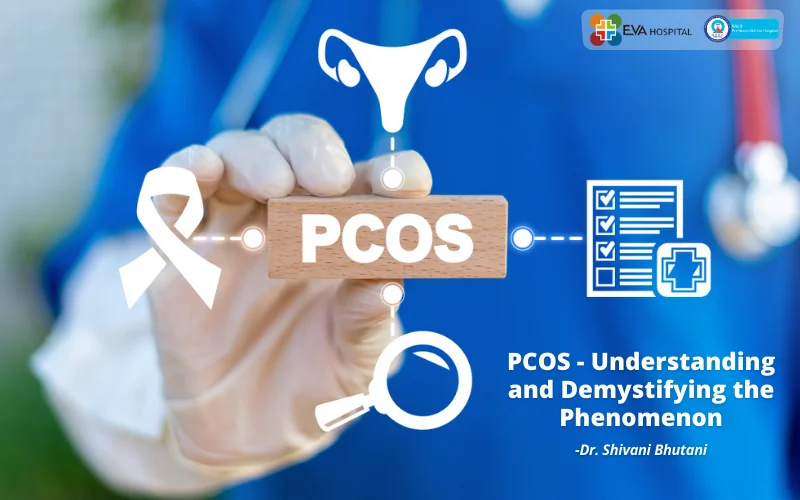PCOS – Understanding and Demystifying the Phenomenon
 Eva Hospital
Eva Hospital
PCOS – Understanding and Demystifying the Phenomenon
Polycystic ovary syndrome or PCOS is a common hormone disorder in women of reproductive age. However, it remains a mystery owing to its diverse diagnosis and deceptive name.
It affects the menstrual cycle and ovulation of the affected female. Due to hormonal defects, eggs do not grow adequately and are not released into the fallopian tubes for fertilization.
These conditions can be fairly controlled with an early diagnosis and reduce the risk of complications.
Understanding PCOS
PCOS has very mild symptoms due to which the patient tends to ignore them and goes without a definitive diagnosis for years. That’s why patient awareness is very important in this disease. For its early detection, we will try to understand its common symptoms, known causes, the risks involved and the complications it may cause.
Symptoms
The onset of symptoms of PCOS usually occurs around the start of puberty when girls have their first period.
Irregular menstrual cycle
Occasional, irregular or extended menstrual cycles are the commonest symptoms. Periods tend to be heavier, fewer and far apart.
Surplus male hormone
The presence of an excess level of the male hormone androgen causes mannish symptoms such as facial hair, body hair, and male pattern baldness.
Polycystic ovaries
With residual oocytes attached to the ovarian walls, they become enlarged and do not perform normal functions.
Obesity
Weight gain can be both a symptom as well as a cause of PCOS. Additionally, if you are overweight, other symptoms become more severe.
Emotional problems
Depression and mind swings are also attributed to this ovarian disorder.
Causes
Although the precise reason for PCOS is unknown, there are quite a few known factors that contribute to abnormal endocrine behaviour.
- Insulin resistance- Insulin is a hormone secreted by the pancreas. It enables cells to utilise sugar. If the cells become resistant to the insulin, then the blood sugar levels rise, inducing the pancreas to produce more insulin. It further stimulates androgen production, influencing ovulation.
- Low-grade inflammation. Studies have shown that a type of inflammation prevents the ovaries from producing adequate sexual hormones for normal egg release.
- Genetics. Certain genes are associated with PCs, indicating that the condition can be inherited too.
Complications
If not diagnosed and treated early, PCOD can cause other problems in females which can be serious.
Topping the list is infertility & type 2 diabetes, followed by high blood pressure, high blood sugar, abnormal cholesterol level increasing the risk of heart problems, endometrial cancer, sleep apnea, depression, anxiety and eating disorders.
During pregnancy, there might be a risk of miscarriage or premature delivery. Metabolic syndrome and liver inflammation are also found to be linked to PCOS.
PCOS & Fertility
Polycystic ovarian disorder or PCOD causes hormonal imbalance, increasing the level of male hormones and decreasing that of female hormones.
It causes problems in conception and pregnancy. But do not worry. Dr Shivani Bhutani, a senior infertility specialist in Ludhiana,
Says that Polycystic women can also become pregnant with a combination of hormonal therapy and assisted reproductive techniques or ART.” They can have a normal pregnancy and healthy children.
Dietary Tips for PCOS
Foods to include
Studies indicate a strong impact of food intake on polycystic women. The following goods are beneficial and help in the management of PCOD.
- Foods with a low glycemic index- digest slowly and keep the insulin level under control. These include lentils, whole grains, seeds, nuts, fruits, and unprocessed carbs.
- Anti-inflammatory foods- fish, berries, leafy vegetables, and virgin oil reduce inflammation which is one of the causes of the condition.
- DASH diet- this includes nutrients that lower the risk of cardiovascular disease and hypertension. Add eggs, low-fat milk, grains, fruits & vegetables in abundance
- Dark coloured foods- red grapes, blueberries, cherries, broccoli, kidney beans, spinach, watermelon, beetroot etc.
Foods to Avoid
Firstly, avoid fats to stop weight gain. It is most important. To manage your PCOD condition, limit your intake of:-
- Refined carbs- maida, pasta, pizza, pastries and white bread.
- Fast food- colas, sweet beverages, soda or energy drinks
- Processed meats- red meat, steak, burgers, sausages, mass-produced frozen snacks
Taking Action
When it comes to the management of PCOS, it is important to be physically active and exercise regularly to maintain weight. Seek valid knowledge from trusted health professionals.
Discuss mood swings and depression with your doctor. Maintain an active and healthy lifestyle.
And most importantly, get the best gynaecological consultation you can. Discuss your options.
Outlook
Proper management of PCOS can remarkably curtail its symptoms and adverse effects on your fertility & overall health.









